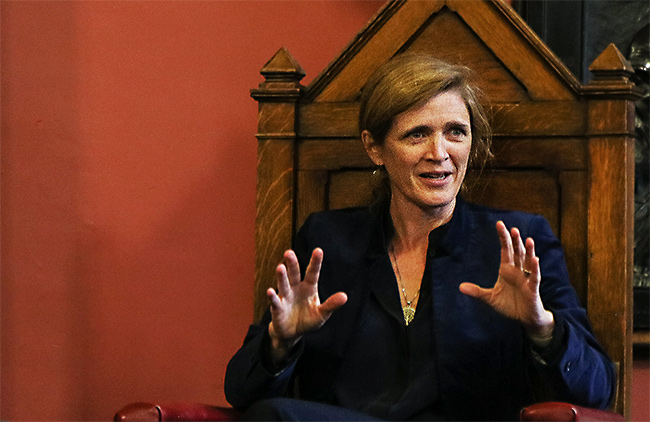
With the presidential election looming, the world is anticipating what the next four years of American politics will look like. This week, the School of Law and Trinity Research in Social Sciences co-hosted a webinar to investigate this question, with the support of the Society of Legal Scholars. With the School of Law’s Dr Donna Lyons moderating the virtual event from Regent House, panelists Samantha Power and Cass R. Sunstein discussed the current political tensions in the US, the effects of the Trump presidency and the possibility of a Biden victory.
Samantha Power studied at Yale and Harvard Law School. She served as the US ambassador to the United Nations from 2013 to 2017 and as a member of President Barack Obama’s cabinet during his presidency. Award-winning writer of A Problem From Hell: America and the Age of Genocide, among other works, Power is also the founding executive director of the Carr Centre for Human Rights Policy at the Kennedy School. She is currently a Professor of Practice at the Harvard Kennedy School and Harvard Law School.
Her husband, Cass R. Sunstein, served as administrator of the White House Office of Information and Regulatory Affairs from 2009 to 2012. He too has penned countless articles and books including Impeachment: A Citizen’s Guide and How Change Happens. He was appointed chair of the World Health Organisation’s technical advisory group on behavioural insights and sciences for health earlier this year, and is currently the Robert Walmsley University Professor at Harvard.
Speaking from her home in Massachusetts, Power began by recounting her experience of the 2016 election night: “I was so unconcerned about the outcome of the presidential race that I arranged an election night party at the ambassador’s residence.” Though expected to be diplomatic, the ambassadors who attended Power’s party “made it no secret that they longed to see a woman become the US president”. One guest even exclaimed: “At what time will we know that Hilary has won?” For Power, “this was to be the night when young girls saw, and thus believed, that they could do anything. Instead we were about to elect to our highest office, a man who had boasted about forcing himself on women”.
Lyons flipped the discussion on its head by asking: “Were there any silver linings of the Trump administration?” In response, Sunstein highlighted the “outpouring of attention” for issues of climate change and human rights in response to Trump’s policies and political actions, which he considered to be “fundamental for a healthy democracy”. Power referenced the importance of the spike in female voting turnout for the midterm elections in 2018, alongside the striking statistic that in the last two years there has been a 22 per cent increase in the amount of women running for the House of Representatives. In this vein, she prompted the women of Ireland to “make the change you seek”.
PhD student Sahar Ahmed asked the panelists what steps they believe need to be taken to repair some of the “harms that have been done” by the Trump presidency. Sunstein replied that it won’t be one man, but the entire White House, that will have to work together to repair global relations and public trust in the American democracy. Power added that in order to restore international alliances, America will need to begin competently dealing with issues of “police reform, healthcare, election infrastructure”. “We’ve got to get that right as the foundation for restoring trust”, said Power.
When asked about the future, in the event of Trump winning a second term as president, Sunstein answered in one short sentence: “If you’re a pessimist you suffer twice – that is my full answer to that question.” Power gave a more political response, citing fears about the bypassing of “laws and norms and ethics in the interest of one man”. Although she concluded in the same spirit as her husband, saying: “Don’t borrow trouble from the future.”
Speaking about Joe Biden’s presidential campaign, Sunstein recounted a personal story of ending up in hospital following a car accident, where Biden was the first person to ring him out of concern. Sunstein was very touched by this gesture given that he wasn’t in Biden’s closest network of friends, saying “his empathy knows no bounds”. “That personal characteristic defines how he is as a public servant”, he concluded, “whether you’re right or left or centre, that’s what you get from him”.
A recording of the webinar is available to watch on the School of Law’s Facebook page and Dr Donna Lyons Youtube.






